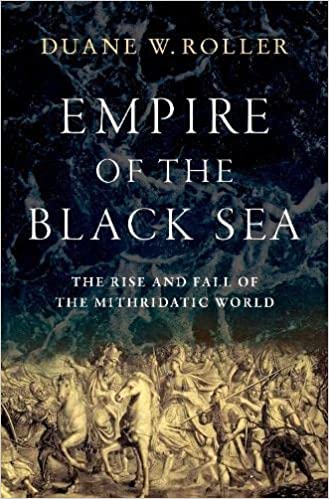Roller, Duane W. Empire of the Black Sea: The Rise and Fall of the Mithridatic World. Oxford: Oxford University Press, 2020.
2022 has been something of a Pontic odyssey for me, from Barry Cunliffe’s work on the ancient Scythians north of the Black Sea to now Duane Roller’s work on one of Republican Rome’s great adversaries, the kingdom of Pontos under Mithridates VI “The Great;” such is the Amazon algorithm, sometimes. Since reading the works of Peter Heather and Chris Wickham I’ve become increasingly interested in the history of Rome in the east, and so Empire of the Black Sea particularly caught my interest when suggested. A little earlier than my usual Roman fare, and focusing on a region that in five centuries would form the heartlands of the surviving Eastern Empire, Roller’s work seemed perfect to broaden my ancient historical horizons while deepening my grasp of Near Eastern historical context. While it certainly accomplished all this, I couldn’t help but be slightly disappointed that it didn’t do more.
Empire of the Black Sea is in fact the first history of the Kingdom of Pontos (located along what is today the Black Sea coast of Asian Turkey) written in the English language. Indeed, as Roller notes in his introduction, it is only the second ever history to deal with the entire kingdom in its own right, not just the career of Mithridates VI, the first being a German history published in 1879. Such a work is long overdue, then, especially considering how large a role the campaigns against Mithridates played in the waning years of the Roman Republic. Roller begins by discussing the murky origins of the kingdom in the fracas between Alexander the Great’s companions and successors as they attempted to divide the Hellenistic world between them. From a minor Persian courtier’s refuge to minor regional power to nemesis of Rome, Empire of the Black Sea is a tidy little case study of state-building in the ancient world, filled with as much information as Roller’s admirably responsible narrative can glean from all-too-often spotty or nonexistent evidence. As the evidence gets more prolific, however, the narrative expands, and a full half of the book is devoted to the reign of Mithridates VI and his fraught relationship with Rome, ultimately concluding with his defeat, exile, and suicide.
As I read, I both appreciated the historical legwork Roller provided and began to wonder if there wasn’t a reason no history of Pontos had been written in almost one hundred and fifty years. Devoting half his book to only the final ruler of the Mithridatic dynasty seems to faintly argue in favor of all the other historical works that only concern themselves with Mithridates VI, and Roller’s treatment of even that king seems to ironically argue against his importance in his own right; I couldn’t help but think that if Rome had not been occupied with other, more pressing, threats simultaneously, Mithridates would have been mopped up quite easily.
The absence of any real argument only reinforced this impression, and combined with odd choices in organization (inserting a chapter on the court life and culture of Mithridates VI in the middle of the political narrative) and sourcework (no mention of Cunliffe’s The Scythians, leading to erroneous claims of the word “Skythians” being a generic racial catch-all term in this period) unfortunately left me feeling exactly whelmed by Empire of the Black Sea. It is an interesting account of ancient history, but considering all these factors, I cannot determine whether its subject matter should be considered a mountain or a molehill in the grand scheme of history, and so can only say to judge for yourself if ever you’re in the mood.
